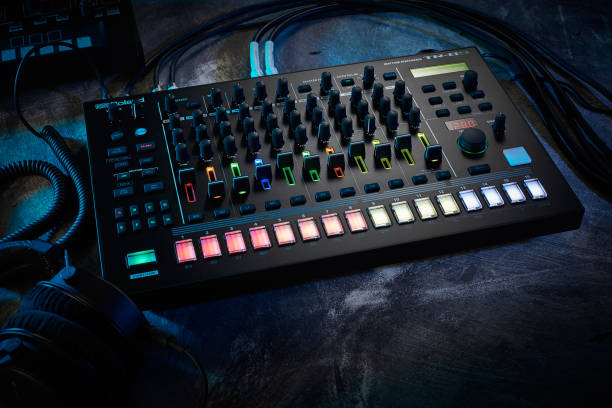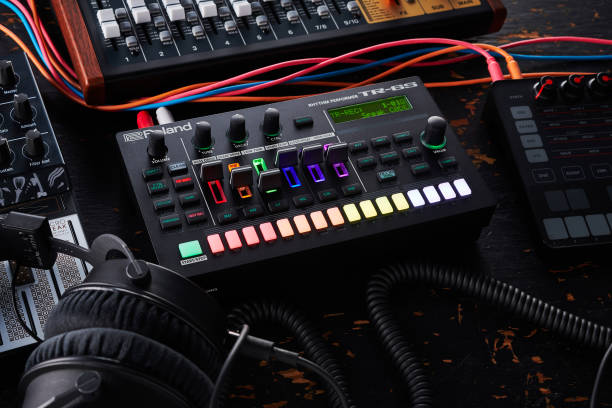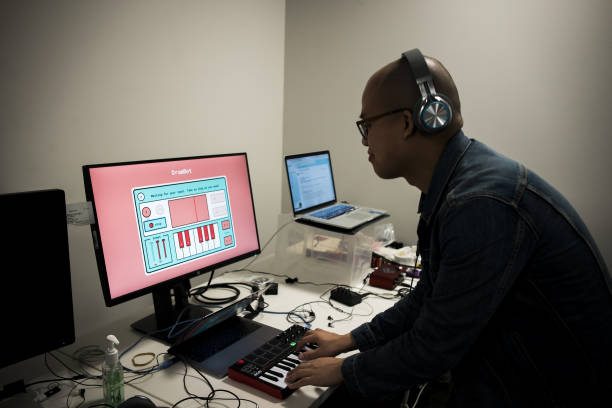The intersection of drum machines and artificial intelligence (AI) is reshaping the landscape of music production. As these two technologies converge, they are not only redefining how beats are created but also sparking discussions about creativity, authenticity, and the future of music. Let’s explore this fascinating relationship and uncover its broader implications.

The Evolution of Drum Machines and Artificial Intelligence in Music
Drum machines have been a cornerstone of modern music for decades. From the iconic Roland TR-808 to today’s sophisticated hardware, these devices have revolutionized how rhythm is crafted. Initially designed to mimic real drummers, drum machines quickly found their unique voice, becoming indispensable in genres like hip-hop, electronic, and pop. Modern drum machines now offer advanced features, including customizable patterns, intuitive interfaces, and integration with digital audio workstations (DAWs). Their adaptability has cemented their place in both amateur and professional studios worldwide.
Artificial Intelligence in Music: Beyond the Basics
Artificial intelligence is making significant inroads into music, and drum machines are no exception. By leveraging AI algorithms, drum machines can now generate complex, human-like rhythms, adapt to musical contexts, and even “learn” an artist’s preferences over time. This development allows musicians to explore uncharted creative territories. AI-powered drum machines employ techniques like deep learning and neural networks to analyze vast libraries of musical data. This capability enables them to predict rhythmic patterns, suggest variations based on a song’s mood, and automatically sync beats to other instruments. Such innovations reduce the time spent on repetitive tasks, enabling artists to focus on the essence of music creation.
Creativity vs. Authenticity: The Debate
While the capabilities of AI-powered drum machines are impressive, they raise questions about the authenticity of music. Can a machine-generated beat evoke the same emotional depth as one crafted by a human drummer? Does reliance on AI diminish the role of human creativity? Supporters argue that AI complements human creativity rather than replacing it. By handling technical aspects, AI frees musicians to experiment and push artistic boundaries. Critics, however, caution against over-reliance, suggesting it could lead to homogenized music devoid of personal touch.

Applications of Drum Machines and AI in Modern Music
1. Personalized Beat Creation
AI-powered drum machines enable artists to create beats tailored to their unique style. By analyzing an artist’s previous works, these machines can suggest rhythmic patterns, adjust tempo and dynamics, and offer creative variations. This personalization fosters a seamless blend of human artistry and technological innovation.
2. Collaborative Composition
Collaboration between musicians and AI drum machines is transforming music composition. These tools act as creative partners, generating ideas that artists might not conceive on their own. This synergy is particularly beneficial for indie artists seeking inspiration and producers aiming for fresh perspectives.
3. Educational Opportunities
Drum machines powered by AI are valuable educational tools. They help aspiring musicians understand complex rhythms, learn drumming techniques, and experiment with various musical styles. This accessibility democratizes music production, empowering individuals regardless of their skill level.
Challenges and Ethical Considerations
While the fusion of drum machines and AI offers immense potential, it also presents challenges. Key issues include intellectual property, as questions arise over who owns the rights to AI-generated music. Ethical use is another concern, with musicians needing to ensure that AI tools are used responsibly. Lastly, dependency on AI could stifle human creativity in the long run. Addressing these concerns requires a balanced approach, integrating innovation with ethical safeguards.
Future Trends: What Lies Ahead?
The evolution of drum machines and AI is just beginning. Future developments may include emotion-aware AI, where drum machines adapt rhythms based on the listener’s emotional state. Enhanced realism, with AI models capable of replicating nuanced drumming styles, is another possibility. Improved compatibility with other AI-driven music tools will also lead to seamless integration. These advancements promise to elevate music production to unprecedented heights.
FAQs
1. How do AI-powered drum machines work?
AI-powered drum machines use algorithms to analyze musical data, predict patterns, and generate rhythms. By leveraging deep learning, they adapt to user preferences and provide personalized suggestions.
2. Are drum machines replacing human drummers?
No, drum machines are tools that complement human drummers. They handle repetitive tasks and inspire creativity, but the emotional and improvisational elements of drumming remain unique to humans.
3. Can AI-generated beats be copyrighted?
This is a complex legal issue. In many cases, copyright laws do not yet fully address AI-generated content, leading to ongoing debates about ownership.
4. How can beginners benefit from AI-powered drum machines?
Beginners can use AI drum machines to learn rhythm, experiment with styles, and gain confidence in music production. These tools provide guidance and inspiration, making them accessible for all skill levels.
The convergence of drum machines and artificial intelligence is transforming the music industry. By blending cutting-edge technology with artistic expression, this partnership is paving the way for a new era of rhythm and creativity. As musicians and technologists continue to collaborate, the possibilities for innovation are boundless.
